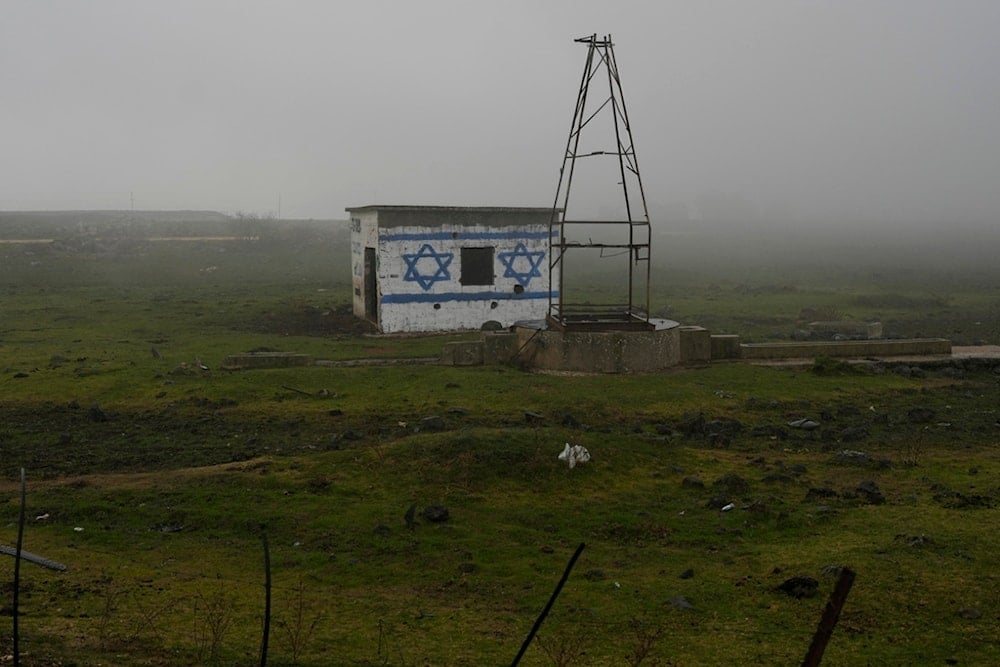'Israel', Turkiye expand influence in post-Assad Syria: Bloomberg
Turkiye has ramped up its operations in northern Syria, focusing on curbing Kurdish groups affiliated with the PKK.
-

A house painted with the colors of the Israeli flag is seen next to a road in the Israeli-controlled Golan Heights, on a foggy Sunday, December 22, 2024. (AP)
Significant geopolitical shifts are unfolding in Syria following the recent ousting of longtime leader Bashar al-Assad by the Hay'at Tahrir al-Sham-led rebels, Bloomberg reported on Sunday.
The power vacuum has prompted regional players, including the Israeli occupation and Turkiye, to take swift actions aimed at securing their strategic interests.
"Israel's" forces have advanced eastward into a buffer zone established by a ceasefire agreement nearly 50 years ago.
The regime has reportedly expressed concerns over the potential rise of jihadi groups near the borders.
"Israel will not permit jihadi groups to fill that vacuum and threaten Israeli communities," Israeli Prime Minister Benjamin Netanyahu's office said last week.
The office noted that the deployment is temporary and contingent on the new Syrian administration, now led by HTS, adhering to the 1974 ceasefire agreement.
Read more: UNSC extends UNDOF mandate in Golan Heights for another 6 months
Meanwhile, Turkiye has ramped up its operations in northern Syria, focusing on curbing Kurdish groups affiliated with the PKK, an organization that has sought autonomy within Turkiye.
Backed by Turkish funding and military support, the Syrian National Army (SNA) has seized strategic towns from the US-backed Syrian Democratic Forces (SDF).
Turkish President Recep Tayyip Erdogan aims to establish a buffer zone along the 900-kilometer border, though achieving this goal entirely remains challenging.
West testing Syria's new government ahead of sanctions decision
According to The Wall Street Journal, diplomats from Washington and European capitals visited Damascus this week to assess whether they can trust the emerging transitional government led by HTS.
This situation mirrors past dilemmas, such as the Taliban's rise to power in Afghanistan and the challenges posed by governments with unclear human rights commitments. HTS, initially formed as an al-Qaeda subsidiary, is led by Ahmad al-Sharaa, who spent five years in a US prison camp in Iraq. He has since claimed to renounce extremism and vowed to respect Syria's ethnic and religious diversity.
Before the West decided to lift sanctions on Syria, it stated clear directives that would guarantee the protection of minorities and women and the complete destruction of alleged chemical weapons developed during the Assad tenure. The current government must also vow to counter terrorist groups such as ISIS and return the millions of Syrian refugees scattered around the world back home.
But most importantly, the West, according to WSJ, does not want Syria to fall into the hands of Iran or Russia. "Western states are quickly coming to the conclusion that they have to engage with HTS despite its terrorist listing," Julien Barnes-Dacey, director of the Middle East and North Africa program at the European Council on Foreign Relations, said.
Read more: Russia must exit Syria for EU to lift sanctions on HTS: Dutch FM

 3 Min Read
3 Min Read








